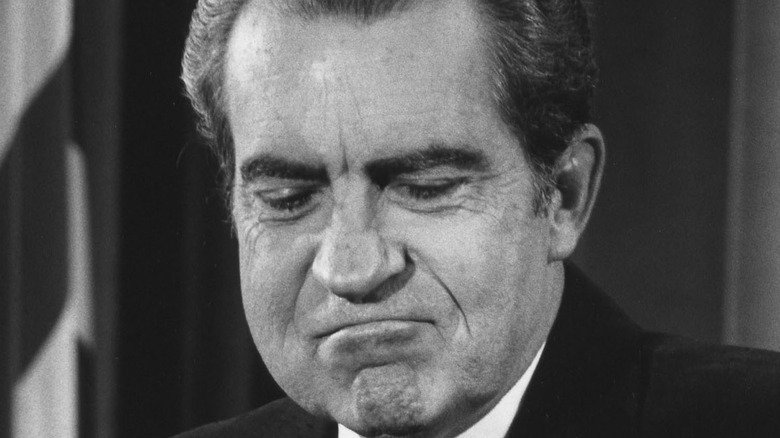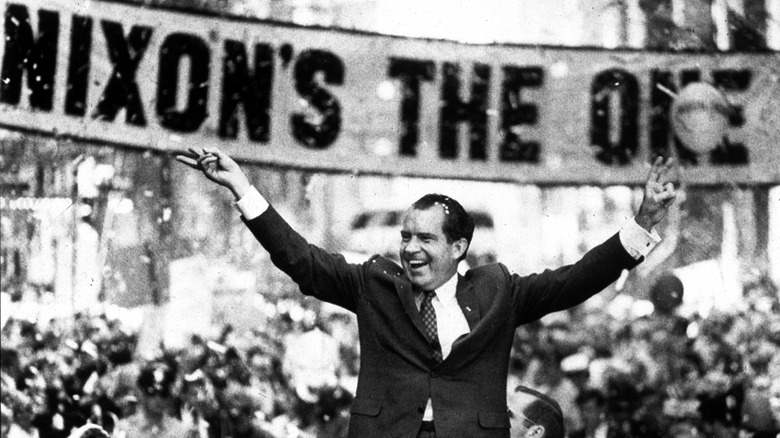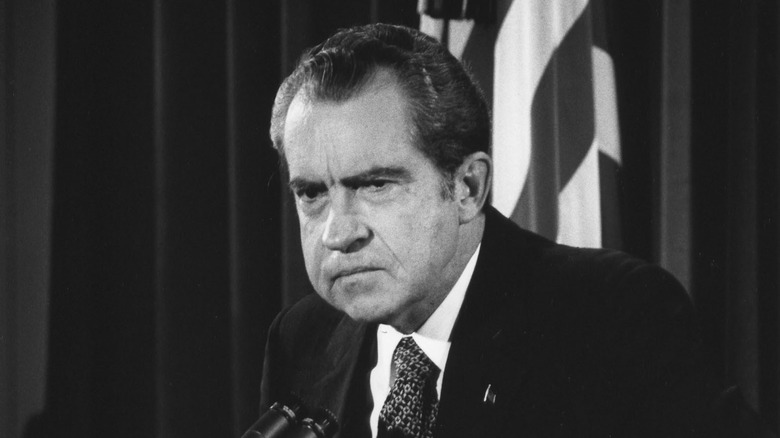The Real Reason Richard Nixon Hired Someone To Spy On His Own Brother
Richard Nixon was a deeply paranoid man. He didn't know where to place his trust, and he was convinced everyone (except a chosen few) was out to get him. Of course, years of lying, spying, and cover-ups can do that to a person. By the time the Watergate scandal finally forced his resignation to avoid impeachment on August 8, 1974, Nixon had collected more than 3,000 hours of secret recordings of the White House alone, according to the National Archives. That massive trove of recordings didn't even include the long list of people outside 1600 Pennsylvania that he and his administration had wiretapped or placed under physical surveillance as part of his unhinged approach to maintaining power.
Totally unbeknownst to them, Nixon had recorded political friends and foes, alike. "Mum's the whole word. I will not be transcribed," Nixon told his closest aides, Alexander Butterfield and H.R. Haldeman, according to The Washington Post. Nixon added: "[M]aybe we want to put out something that's positive, maybe we need something just to be sure that we can correct the record." But Nixon soon expanded the reasons, the list of people, and the methods for his information gathering to include wiretapping and physical surveillance to gain political leverage. It was only a matter of time before Nixon saw the value in spying as a means to prevent political problems before they could arise — even if it meant spying on his own brother.
The poison Nixonburger
Back in the 1950s, as Richard Nixon rose in the Republican Party ranks as a California congressman and senator, the politician's younger brother, Donald Nixon, sought to capitalize on the growing popularity of the family name. Donald opened Nixon's, a drive-in family restaurant where customers could get fish sticks and fries, a banana split, or a "Nixonburger" with cheese for as little as 20 cents, according to Restaurant-ing Through History.
But even with that kind of name association, all was not well on the business front. So, Donald took a loan of $205,000 from Howard Hughes, the controversial film producer who was known as much for his wealth as he was for his eccentricities — particularly his reclusiveness. The loan became fodder for the press, as well as Nixon's political adversaries in his White House bid against John F. Kennedy in 1960. Nixon's political enemies insisted that Hughes would wield power over the White House should he win. "What about the Hughes loan?" became a thorn in his side.
If it wasn't enough that Nixon had lost his 1960 presidential bid, the Hughes loan ended up being a lost cause, anyway. Even with the influx of cash, the chain went under, and Donald filed for bankruptcy in 1961. In his book, Six Crises, Nixon wrote that his brother came to him the day after his defeat and "said with his voice breaking: 'I hope I haven't been responsible for losing the election.'"
As president, Richard Nixon spied on his own brother
When Richard Nixon successfully ran for president in 1968, he made a determination that he would not let anybody be the source of his downfall. It didn't matter if it was his political enemies or his inner circle; he trusted no one, and that included his younger brother Donald. As Watergate investigators put it, "Nixon and his White House aides feared that the brother was involved in questionable financial deals and wanted to keep tabs on them," per Showbiz CheatSheet. The new president even arranged for his younger brother to be hired as an executive at Marriott Corp. as a way to keep him away from his own "entrepreneurial" pursuits, Associated Press reported.
Later, during the peak of the Watergate investigations, Nixon justified wiretapping his own brother by saying it was important to learn "what others who were trying to get him to use improper influence . . . might be doing," the Los Angeles Times reported. However, the investigators determined that Nixon and his aides were worried about Donald's problematic business dealings and wanted to look after him so they could preemptively act before any more embarrassments as with the Hughes loan. For his part, Donald racked up a serious dose of resentment. "I didn't need anyone telling me how to behave," he said. "I didn't like it a goddamned bit."


